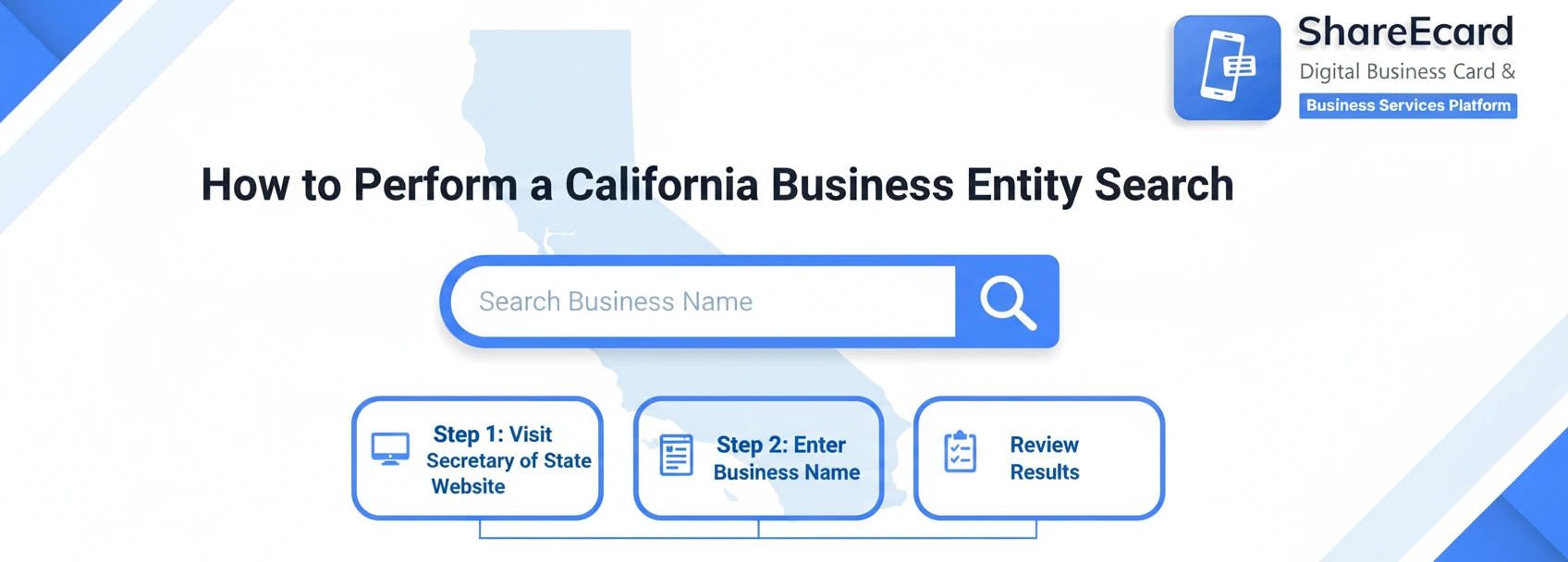Starting a business in California is an exciting venture, but it begins with crucial groundwork. One of the most important first steps is performing a California business entity search. Whether you’re choosing a unique name for your LLC or researching a potential partner, this process is vital for compliance and due diligence.
This guide will walk you through exactly how to use the California Secretary of State’s business search tool, what the results mean, and why it’s so important for your entrepreneurial journey.
Why You Need to Do a California Business Search
Conducting a business entity search California is not just a formality; it’s a critical step for several reasons:
- Name Availability: California requires your business name to be distinguishable from existing entities. A search ensures your chosen name isn’t already taken.
- Due Diligence: If you’re partnering with another company, investing, or hiring a vendor, you can verify their legal standing and details.
- Compliance: It helps you ensure you are not infringing on an existing trademark or business name within the state.
- Information Gathering: You can find important details like a company’s registered agent, filing status, and formation date.
Step 1: Access the Official California Business Search Tool
The only official source for this information is the California Secretary of State (SOS). To begin your California SOS business search, navigate to the Secretary of State’s Business Search portal. This is often referred to as the California Secretary of State business search page. Avoid third-party sites that may charge fees for this free public service.
Step 2: How to Search – Understanding Your Options
The California SOS portal offers several ways to look up a business. Knowing which method to use will save you time.
1. Search by Business Name (Most Common)
This is the method you’ll use for a California business name search when checking for your LLC or corporation’s name availability.
- Tip: Start with a broad search using just the key words of your desired name. For example, if you want “Golden State Tech Solutions,” first search for “Golden State Tech.” This will show you all similar names.
2. Search by Entity Number
If you already know the specific identification number assigned to a business by the state, you can search directly with it. This is the fastest way to find a specific record.
3. Search by Registered Agent Name
You can also perform a California registered agent search. This is useful if you need to find all the businesses a specific agent or service represents.
4. California Corporation Search and California LLC Search
While the main search bar handles all entity types, you are often performing a specific type of lookup. The process is the same, but your goal defines the search:
- California corporation search: Used to find details about existing C-Corps or S-Corps.
- California LLC search: Used to find details about Limited Liability Companies.
- California company search: A more general term that encompasses both.
Step 3: Performing a California Business Name Search
Let’s walk through a typical California business lookup by name.
- Go to the California Secretary of State business search website.
- Select the “Business Name” tab.
- Enter the proposed name for your California LLC search or California corp search.
- Click “Search.” You do not need to enter words like “LLC,” “Inc.,” or “Corp.”
What to Look For in the Results:
- If you get exact matches, that name is unavailable.
- If you get names that are deceptively similar, you may need to choose a different name.
- If you get no results, the name is likely available for you to use.
Step 4: Understanding the California Entity Search Results
After your California entity search, you’ll be presented with a list of results. Clicking on a specific entity will bring up its detailed record. Here’s what you’re looking at:
- Entity Name: The official legal name of the business.
- Entity Number: The unique ID assigned by the state. Keep this number for your records.
- Registration Date: When the entity was formally formed.
- Principal Address: The business’s main office address.
- Mailing Address: Where official correspondence is sent.
- Registered Agent Information: The name and address of the California registered agent responsible for receiving legal documents. This is a critical piece of information.
- Status: This is crucial. It will say “Active,” “Dissolved,” “Suspended,” etc. You only want to do business with “Active” entities.
- Jurisdiction: If the company is a Delaware LLC operating in California, for example, it will be noted here.
Beyond the Search: Related California Business Filings
Performing a California business entity search is often the first step in a longer journey. Once you’ve confirmed your name is available, here’s what often comes next:
1. Filing a Statement of Information
After forming your LLC or corporation, you must file a Statement of Information California (Form LLC-12 for LLCs or Form SI-550 for corporations). This is a periodic update to keep your company’s details current with the state.
2. Obtaining a Business License
A California business license is required to operate legally in your city or county. This is separate from your state-level formation. You may also need a California business license search to verify the licensing of other businesses.
3. Understanding DBA Requirements
If you plan to operate under a name different from your official entity name, you will need to file a DBA California (“Doing Business As”) or Fictitious Business Name statement with your county clerk’s office.
4. California LLC Formation
If you are starting a new business, the most common next step after your name search is California LLC formation. This is the process of officially creating your Limited Liability Company with the state by filing Articles of Organization.
FAQs
Q: What if my desired name is taken?
You will need to get creative. Try adding a descriptive word, using an abbreviation, or rearranging the words until you find a unique, available name for your California company search.
Q: Is a California SOS business search the same as a trademark search?
No. The California business entity search only checks for names within the state. A trademark, which can be national, is a separate form of intellectual property protection. You should conduct a trademark and registered search through the USPTO if you are concerned about brand protection.
Q: How do I look up a business for a potential partnership?
Use the California business lookup tool to verify the company’s status is “Active,” confirm its Registered Agent, and find its official address. This is a fundamental part of business due diligence.
Q: After I form my LLC, what is a California Statement of Information?
The California Statement of Information is a mandatory report you must file with the SOS within 90 days of formation and then every two years. It ensures the state has your current address and agent information.
Q: Can I use the search to find a company’s EIN?
No. Employer Identification Numbers (EINs) are confidential and are not part of the public record in a California entity search.
Conclusion
Mastering the California business entity search is a non-negotiable skill for any entrepreneur or business professional in the Golden State. It’s the foundation for choosing your business name, ensuring compliance, and making informed decisions.
By using the official California Secretary of State business search portal, you can confidently navigate the initial stages of your business formation, from your initial California LLC search to ongoing compliance with filings like the Statement of Information California. Take the time to do it right, and you’ll set your California business up for a strong and legitimate start.
Also Read:




